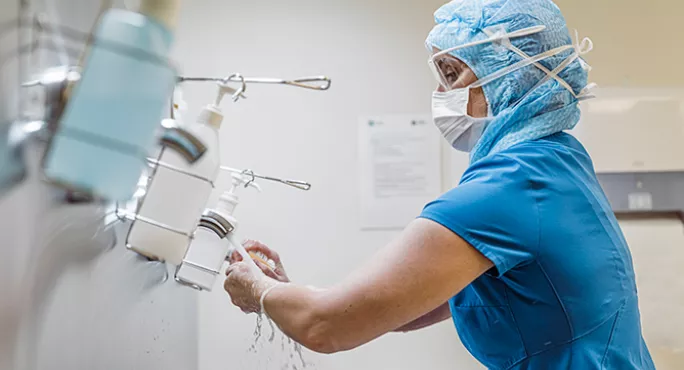
- Home
- The key worker list: what should colleges do?
The key worker list: what should colleges do?

Colleges should only accept key workers' children if they absolutely have to, Bill Watkin, chief executive of the Sixth Form Colleges Association, has said.
Mr Watkin said that as most college students were of an age when they could safely be at home, those who have key worker parents can make a "powerful contribution to the national effort by supporting them and other members of the family in the home, and in doing so reducing the risk of spreading the virus".
He added: "Some students with identified vulnerabilities will fare better in the college and will attend throughout this period of closure. We also need to be conscious of the health, safety and wellbeing of college staff.”
Need to know: Colleges to stay open for 16-18 children of key workers
Profile: Meet Gillian Keegan, apprentice turned skills minister
Specialist colleges: Are vulnerable students safer in college?
On 18 March, prime minister Boris Johnson and education secretary Gavin Williamson announced that college campuses would have to close to the majority of students but remain open for vulnerable students or students whose parents or carers are key workers.
Coronavirus college closures
At midnight on 20 March, the government confirmed the list of key workers and definition of "vulnerable child".
It says: "Vulnerable children include children who are supported by social care, those with safeguarding and welfare needs, including child-in-need plans, those on child protection plans, looked-after children, young carers, disabled children and those with education, health and care plans (EHCPs)."
Key workers include NHS staff, teaching and nursery staff and those involved in food production.
David Hughes, chief executive of the Association of Colleges, said the priority for every college is to keep students safe while enabling key workers to get to work.
"College leaders know what is right for their staff, students and local communities," he said. "SEND and other support staff will be fully across which students need to continue coming to college and which ones will be better off at home. For many students of colleges, the right solution for them is to be at home, supported remotely, because that will reduce risks of contracting the virus. For others, they will still need to physically attend, with the support, care and resources colleges and schools can offer.
"Colleges are working collaboratively with other colleges, schools and the local authority to find solutions for every single student and we are on hand at all times to offer support. Many colleges are offering their facilities to help schools which are struggling to maintain services. Others are opening up childcare centres for key work children. All are acting in the best interests of their communities, exercising their civic duties. Under intense pressure, they will be making quick decisions and judgements in the best interest of those that they serve.”
The key worker list in full
Health and social care
This includes but is not limited to doctors, nurses, midwives, paramedics, social workers, care workers and other frontline health and social care staff including volunteers; the support and specialist staff required to maintain the UK’s health and social care sector; and those working as part of the health and social care supply chain, including producers and distributers of medicines and medical and personal protective equipment.
Education and childcare
This includes nursery and teaching staff, social workers and those specialist education professionals who must remain active during the Covid-19 response.
Key public services
This includes those essential to the running of the justice system, religious staff, charities and workers delivering key frontline services, those responsible for the management of the deceased, and journalists and broadcasters who are providing public service broadcasting.
Local and national government
This only includes those administrative occupations essential to the effective delivery of the Covid-19 response or delivering essential public services such as the payment of benefits, including in government agencies and arms-length bodies.
Food and other necessary goods
This includes those involved in food production, processing, distribution, sale and delivery, as well as those essential to the provision of other key goods (for example, hygienic and veterinary medicines).
Public safety and national security
This includes police and support staff, Ministry of Defence civilians, contractors and armed forces personnel (those critical to the delivery of key defence and national security outputs and essential to the response to the Covid-19 pandemic), fire and rescue service employees (including support staff), National Crime Agency staff, those maintaining border security, prison and probation staff and other national security roles, including those overseas.
Transport
This includes those who will keep the air, water, road and rail passenger and freight transport modes operating during the Covid-19 response, including those working on transport systems through which supply chains pass.
Utilities, communication and financial services
This includes staff needed for essential financial services provision (including but not limited to workers in banks, building societies and financial market infrastructure), the oil, gas, electricity and water sectors (including sewerage), the information technology and data infrastructure sector, as well as key staff working in the civil nuclear, chemicals, telecommunications (including but not limited to network operations, field engineering, call centre staff, IT and data infrastructure, 999 and 111 critical services), postal services and delivery, payments providers and waste disposal sectors.
Register with Tes and you can read five free articles every month, plus you'll have access to our range of award-winning newsletters.
Keep reading for just £4.90 per month
You've reached your limit of free articles this month. Subscribe for £4.90 per month for three months and get:
- Unlimited access to all Tes magazine content
- Exclusive subscriber-only stories
- Award-winning email newsletters
You've reached your limit of free articles this month. Subscribe for £4.90 per month for three months and get:
- Unlimited access to all Tes magazine content
- Exclusive subscriber-only stories
- Award-winning email newsletters



